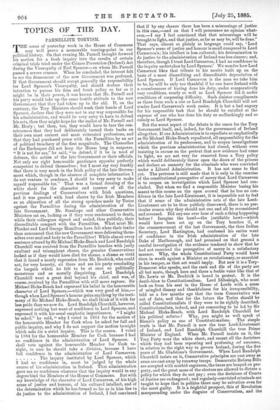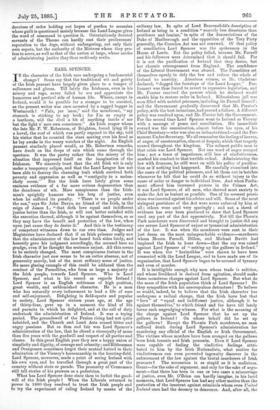TOPICS OF THE DAY.
PARNELLITE TORYISM. THE scene of yesterday week in the House of Commons may well prove a memorable turning-point in our political history. On that evening Mr. Parnell brought forward his motion for a fresh inquiry into the results of certain criminal trials tried under the Crimes Prevention (Ireland) Act during the Viceroyalty of Earl Spencer—on whom Mr. Parnell passed a severe censure. When he concluded, the interest felt to see the demeanour of the new Government was profound. If that Government should accept generally the responsibility for Lord Spencer's Viceroyalty, and should declare their intention to pursue his firm and frank policy so far as it might be in their power, it was known that Mr. Parnell and his party would take up the same hostile attitude to the new Government that they had taken up to the old. If, on the contrary, the Tory Ministers should wash their hands of Lord Spencer, declare that they were not in any way responsible for his administration, and would be very sorry to have to defend his acts, then they might hope for the smiles of Mr. Parnell and Mr. Healy • but then, too, they would have to face the con- sciousness that they had deliberately turned their backs on their own most earnest and most reiterated professions, and that they had purchased peace with the Parnellites by an act of political treachery of the first magnitude. The Chancellor of the Exchequer did not keep the House long in suspense. "it is not for me," he said, "to defend, if it be in need of defence, the action of the late Government or their officials. Not only are right honourable gentlemen opposite perfectly competent to defend themselves ; but I must say very frankly that there is very much in the Irish policy of the late Govern- ment which, though in the absence of complete information I do not venture to condemn, I should be very sorry to make myself responsible for." That was a formal donning of the white sheet for the character and manner of all the previous dealings of Conservatives with Irish questions, and it was greeted with loud cheers by the Irish Members as an abjuration of all the strong speeches made by Tories against the Parnellites during the administration of the late Government. Mr. Stanhope and other Conservative Ministers sat on, looking as if they were condemned to death, while their colleagues signed and sealed, thus publicly, their discreditable compact with the Parnellites. What must Mr. Plunket and Lord George Hamilton have felt when their leader thus announced that the new Government were delivering them- selves over soul and body to the Parnellites?. While almost every sentence uttered by Sir Michael Hicks-Beach and Lord Randolph Churchill was received from the Parnellite benches with justly exultant and triumphant cheers, the genuine Conservatives looked as if they would have died for shame, a shame so vivid that it found a manly expression from Mr. Brodrick, who could not, for very honesty, sit there and see his party concluding the bargain which he felt to be at once so politically monstrous and so morally disquieting. Lord Randolph Churchill went a great deal beyond his chief, and was, of course, received by the Parnellites with still more rapture. Sir Michael Hicks-Beach had expressed his belief in the honourable character of Lord Spencer,—which was very good of him,— though when Lord Spencer's honour gains anything by the testi- mony of Sir Michael Hicks-Beach, we shall think of it with far less pride than we now do. Lord Randolph Churchill, however, expressed nothing but want of confidence in Lord Spencer, and expressed it with his usual emphatic impertinence. "I might be asked," he said, " why I voted in 1884 for the motion of the honourable Member for Cork when he asked for full and public inquiry, and why I do not support. the motion to-night which asks for a strict inquiry. This is the reason. I voted in 1884 for the honourable Member for Cork because I had no confidence in the administration of Lord Spencer. I shall vote against the honourable Member for Cork to- night, in case he should take a division, because I have full confidence in the administration of Lord Carnarvon.
The inquiry instituted by Lord Spencer, which I had no confidence in, must be judged by the whole course of his administration in Ireland. That administration gave me no confidence whatever that the inquiry would in any degree bind the Members of the House of Commons. But with my knowledge of the character of Lord Carnarvon, of his high sense of justice and honour, of his cultured intellect, and of the determination which he has formed so far as in him lies to do justice to the administration of Ireland, I feel convinced that if by any chance there has been a miscarriage of justice in this case,—and on that I will pronounce no opinion what- ever,—I say I feel convinced that that miscarriage will be brought to light, and that justice, as far as may be, will be done.' That says, almost as plainly as language could say, 'Lord Spencer's sense of justice and honour is small compared to Lord Carnarvon's; his intellect is less cultured; his determination to do justice to the administration of Ireland was less sincere; and, therefore, though I trust Lord Carnarvon, I had no confidence in the inquiry undertaken by Lord Spencer.' We wonder how Lord Carnarvon likes that tribute to his merits built up on the basis of a most discrediting and discreditable depreciation of Lord Spencer. If Lord Carnarvon is the man we take him to be, he will be only too thankful if he can leave Ireland with. a consciousness of having done his duty, under comparatively easy conditions, nearly as well as Lord Spencer did it under conditions of surpassing difficulty. Such sinister compliments as these from such a one as Lord Randolph Churchill will not render Lord Carnarvon's work easier. It is but a bad augury for his responsible task that he should be extolled at the expense of one who has done his duty so unflinchingly and so calmly as Lord Spencer.
But the worst aspect of the debate is the omen for the Tory Government itself, and, indeed, for the government of Ireland altogether. If one Administration is to repudiate as emphatically as Sir Michael Hicks-Beach repudiated, all responsibility for the administration of its predecessor, and to reopen investigations which the previous administration had closed, without even insisting in excuse on the pretext that new evidence had come to light, we are not very far removed from a Tory policy which would deliberately throw open the doors of the prisons and declare an amnesty for the criminals who were convicted under a Liberal Administration. It has not come to that yet. The pretence is still made that it is only in the exercise. of the constitutional prerogative of mercy that Lord Carnarvon. is to reopen an investigation which Lord Spencer had con- cluded. But when we find a responsible Minister basing his assent to this course on the open avowal that he has no con- fidence in the late Lord-Lieutenant, it is impossible not to feel. that if some of the administrative acts of the late Lord- Lieutenant are to be thus publicly disavowed, there is no par- ticular reason why they should not one and all be reconsidered and reversed. Did any one ever hear of such a thing happening before ? Imagine the howl—the justifiable howl—which would have • been set up on the Tory benches if, at the commencement of the last Government, the then Indian- Secretary, Lord Hartington, had confessed his entire want of confidence in the Irish administration of the late Duke of Marlborough, and had promised on that ground a. careful investigation of the evidence tendered to show that he had not exercised the prerogative of mercy in a satisfactory manner. Why, the whole Constitutional Party would have risen in wrath against a Minister so revolutionary, so anarchist in his temper, as that act would imply. But now it is a Tory- Democrat who speaks, and the rank and file of the party are all but mute, though here and there a feeble voice like that of Mr. Lewis or Mr. Brodrick is heard in protest. It is the death-blow to Constitutionalism. Lord Iddesleigh, who must look on from his seat in the House of Lords with a sense of mingled dismay and thankfulness for his irresponsibility, told us a few months ago that the term Conservative was out of date, and that for the future the Tories should be called Constitutionalists if they were to be rightly described. Constitutionalists, indeed, and yet consenting to be led by Sir Michael Hicks-Beach, with Lord Randolph Churchill for his political adlatus ! Why, you might as well speak of Rienzi's policy as one of Constitutionalism. The simple truth is that Mr. Parnell is now the true Lord-Lieutenant of Ireland, and Lord Randolph Churchill the true Prime Minister of England. When Mr. Parnell insists on it, the Tory Party wear the white sheet, and recant all the doctrines which they had been repeating and professing ad nauseam, in relation to the right way to govern Ireland, during the five years of Mr. Gladstone's Government. When Lord Randolph Churchill insists on it, Conservative principles are cast away as arms are cast away by runaway troops. Democratic Reform Bills are accepted with morbid eagerness, the taxes are heaped on pro- perty, and the great mass of the electors are allowed to dictate a policy for which they do not pay ; even the decisions of Courts of Justice are endangered; and regularly-convicted criminals are taught to hope that in politics there may be salvation even for the most guilty. It is a frightful prospect, this of Revolution masquerading under the disguise of Conservatism, and the
devotees of order holding out hopes of pardon to assassins whose guilt is questioned mainly because the Land League gives the word of command to question it. Ostentatiously devoted servants of the Throne can hardly cast their predecessors' reputation to the dogs, without endangering, not only their own repute, but the authority of the Mistress whom they pro- fess to serve, as well as that of the nation at large, whose modes of administering justice they thus recklessly revile.



































 Previous page
Previous page